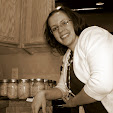Let's talk about some simple things that we can realistically do to make our homes more ready in case of an emergency.
-Have a PLAN!! There are lots of different situations to think about, but if you have a basic idea of what you will do, life will be that much easier. We have a plan on where to meet if there's a fire at your home. Our kids know that they need to run to one specific neighbor's house. That's part of our plan. If my husband is at work and can't be home, we have a meeting place planned. You might also want to talk to your child's school and ask them their emergency procedures. If there is a need to evacuate town, we will drive to my grandma's an hour south.
Your plan can be as simple as that.
-Have a portable 72-hour kit. Click on the links on the RIGHT of the page for more information.
-Know how to shut off your utilities. You need to know how to shut off your water, even in non-emergency situations.
I believe in most cases that the gas company will shut that off if their is a natural disaster, but you may want to call and find out for sure.
We live near an Interstate and if their was a chemical spill from a wrecked semi-truck, there may be a need to shut off items in your home that may caught fire like your water heater or furnace.
-Protect important documents. This could be as simple as using a fire-proof safe, or having an easy to grab Emergency Binder. You may want to make copies and give them to a relative in the event the originals are destroyed.
-Have a "Car kit." I don't have an actually kit in my car, but there are several items throughout my car that will be of use in an emergency. These items may include the following: Blankets, flashlights and batteries, high-energy foods like protein bars, extra clothing, jumper cables, first aid kit, water, small shovel, extra diapers and wipes, etc.
I have used all of these items, except the shovel, in my every day situations as well, so it's good to be prepared for whatever...not only disasters.
-30-day supply of medications. We've talked about 72-hour supply of medication, but depending on the severity of your medical situation, you may want to have a month's worth in your home. You most likely will have to get permission from your doctor and/or insurance company to do this.
-Know how to provide your own lighting, heating and cooking if the power goes out. In most natural disasters, the power is the first thing that goes. I also believe that it is one of the first things to get back into operation, but you may have a few days (or more) at home when you will need to do without. Flashlights are best for light. If you use candles or lanterns, remember to have adequate ventilation. If you have a grill, you can have extra propane or charcoal on hand.
-In conjunction with that, you might want to have a fire extinguisher on hand. I finally went to the store to look at one last summer, and the small ones they make for cars are about $12. Not bad.
-Lastly...my favorite...ALWAYS have at least HALF of a tank of gas in your vehicle!!! With gas prices, if feels better to get a little bit at a time...at least I think so. Also, if I have more than half a tank, I can get to my grandma's house or possibly my parents' house without stopping for gas. You may also want to always have gas in a gas can as well.




No comments:
Post a Comment